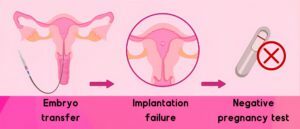The causes of Recurrent Implantation Failure (RIF)


Recurrent implantation failure (RIF) also known as recurrent IVF failure is when high-quality embryos fail to implant for over four fresh or frozen IVF cycles in women who are under the age of 40. Around 10% of couples who undergo IVF treatment may experience this problem. The exact cause of that problem is difficult to determine. In this passage, we will talk about the reasons for recurrent IVF failure.
What causes recurrent IVF failure?
Determining the exact cause of RIF is not easy. There are several factors that can contribute to the failure of embryo implantation the major factors are uterine, male, or embryo factors, as well as the specific type of IVF protocol. In the following paragraphs, we will explain the various factors mentioned below.
- Maternal age
- Smoking
- BMI
- Stress level
- Immunological factors
- Infectious organisms
- Uterine pathologies


The following paragraphs give the details about these causes:
Maternal age
Maternal age is a very important factor in the success of IVF treatment due to its effect on the embryo’s quality. The pregnancy rate decreases when the maternal age increases. The success rates of IVF vary based on the age of the woman. Women aged under 35 have a successful implantation rate of around 55%, ages 35-37 have a success rate of around 41%, ages 38-40 have a success rate of 27%, ages 41-42 have a success rate of 14%, and ages over 42 have a success rate of 4.3%.
Smoking status of both parents
Research showed that smoking has a negative effect on fertility in both men and women. In Women who smoke, the risk of miscarriage is higher than in non-smokers and the rate of live birth decreases. Smoking women have fewer live births, and Maternal smoking was found to be more frequently associated with spontaneous miscarriage with normal fetal karyotype than with abnormal fetal karyotype, implying that the harmful effects of carbon monoxide and nicotine may be the primary factors causing harm.
One of the most harmful impacts of cigarettes on the fetus is that Carbon monoxide decreases the fetus’s oxygen levels, and with nicotine’s vasoconstriction, the mother’s appetite decrease therefore it causes fetus malnutrition. In addition, Cigarette toxins can potentially have negative effects on corpus luteum formation and embryo implementation. The high level of cotinine which is one of the nicotine metabolites can decrease the ova retrieved.
Smoking not only has a harmful effect on women’s fertility but also on men’s fertility. Research indicated that smoking can decrease sperm count in men.
Elevated body mass index
Elevated body mass index can decrease the successful implementation rate. When the BMI of females is higher than 30 (BMI > 30 kg/m2) the failure chance in implementation decreases when compared with patients of average weight (BMI 18.5–24.99 kg/m2).
In patients whose BMI is higher than 40 if the implementation was successful in IVF treatment the chance of miscarriage increases. Implementation failure and miscarriage risk in women whose body index mass (BMI) is higher than 25 are much more than in women with normal weight with the same number of collected oocytes. Obese women required more gonadotropin stimulation cycles, yet they had statistically fewer oocytes for collection, the more collected oocytes the more chance of successful pregnancy in IVF treatment. This implies that obesity may impact oocyte quality and follicular development.
Stress levels
Some studies have found that stress can reduce IVF success, whereas others have found no meaningful effect.
One study that discovered a negative effect of stress on IVF outcome looked at cortisol, a stress hormone, levels in IVF women. The study discovered that women with greater cortisol levels had a reduced likelihood of becoming pregnant or risk of miscarriage increases during the first three weeks after conception. When Cortisol production in the body increases in response to various stressors, it acts as a marker indicating that the female body is not in its optimal reproductive state.
Another study looked at the effects of stress on embryo quality. The study discovered that stressed women had embryos that were less likely to implant and grow into a pregnancy.
Other research, however, has not discovered an identifiable effect of stress on IVF success. There was no correlation between stress and pregnancy rates, according to one study that examined the outcomes of more than 3,500 women who underwent IVF.
The effects of stress on the success of IVF may vary from woman to woman. The consequences of stress may affect some women more than others. This kind of stress may also be important. For instance, some studies have revealed that while chronic stress may have no influence on IVF outcome, acute stress—such as the stress associated with performing IVF—may have a detrimental impact.
Immunological factors
Immunological variables may affect IVF success rates, according to an increasing number of studies. The following immunological variables have been researched:
Antiphospholipid antibodies (APAs). Antibodies called APAs can damage the uterine lining, which makes it challenging for an embryo to implant.
NK cells, or natural killer cells. White blood cells called NK cells are able to destroy foreign cells, including embryos.
Cytokines. Proteins called cytokines control the immune system. While some cytokines can impede implantation, others can encourage it.
Different immunological variables have different impacts on IVF success rates. Some women with APAs or high NK cell counts can still be able to conceive with IVF. However, for other women, these factors may make it more difficult to conceive.
Infectious organisms
There is some proof that infectious agents can affect the success rates of IVF. For instance, one study discovered that women with bacterial vaginosis (BV) had a lower chance of conceiving following IVF than those without BV. A shift in the equilibrium of bacteria in the vagina leads to BV, a common vaginal infection. It is believed that BV may make premature abortions riskier.
According to a different study, women with chlamydia had a lower chance of getting pregnant following IVF than those without the infection. Sexually transmitted infections like chlamydia can inflame the reproductive system. Chlamydia may harm the fallopian tubes, which would make it more challenging for an embryo to implant.
Uterine pathologies
Infertility treatment success rates might be impacted by uterine diseases or uterine anomalies. The following are some of the most typical uterine diseases that can impact IVF success:
Endometriosis. The disorder known as endometriosis is characterized by the growth of uterine lining tissue outside the uterus. The uterus may become inflamed and scarred as a result, which could make it challenging for an embryo to implant.
Pelvic polyps. Small growths called uterine polyps can form in the uterine lining. Sometimes they can prevent the implantation of an embryo.
Uterine fibroids. Non-cancerous growths called uterine fibroids can form in the uterus’ muscle. Sometimes they can alter the uterus’s shape, which can make it challenging for an embryo to implant.
Septate uterus. When the uterus is separated by a tissue wall, the condition is known as a septate uterus. This may hinder embryo implantation or raise the possibility of miscarriage.
Asherman’s syndrome. In the uterine lining, Asherman’s syndrome is a disorder where scar tissue forms. This may hinder embryo implantation or raise the possibility of miscarriage.
Before or during IVF, your doctor might advise treatment if you have a uterine pathology.
How to schedule an appointment to get information about RIF causes and treatments?
With IVF Turkey Team you can easily make an appointment. First, we recommend contacting one of the specialists in our clinic.



